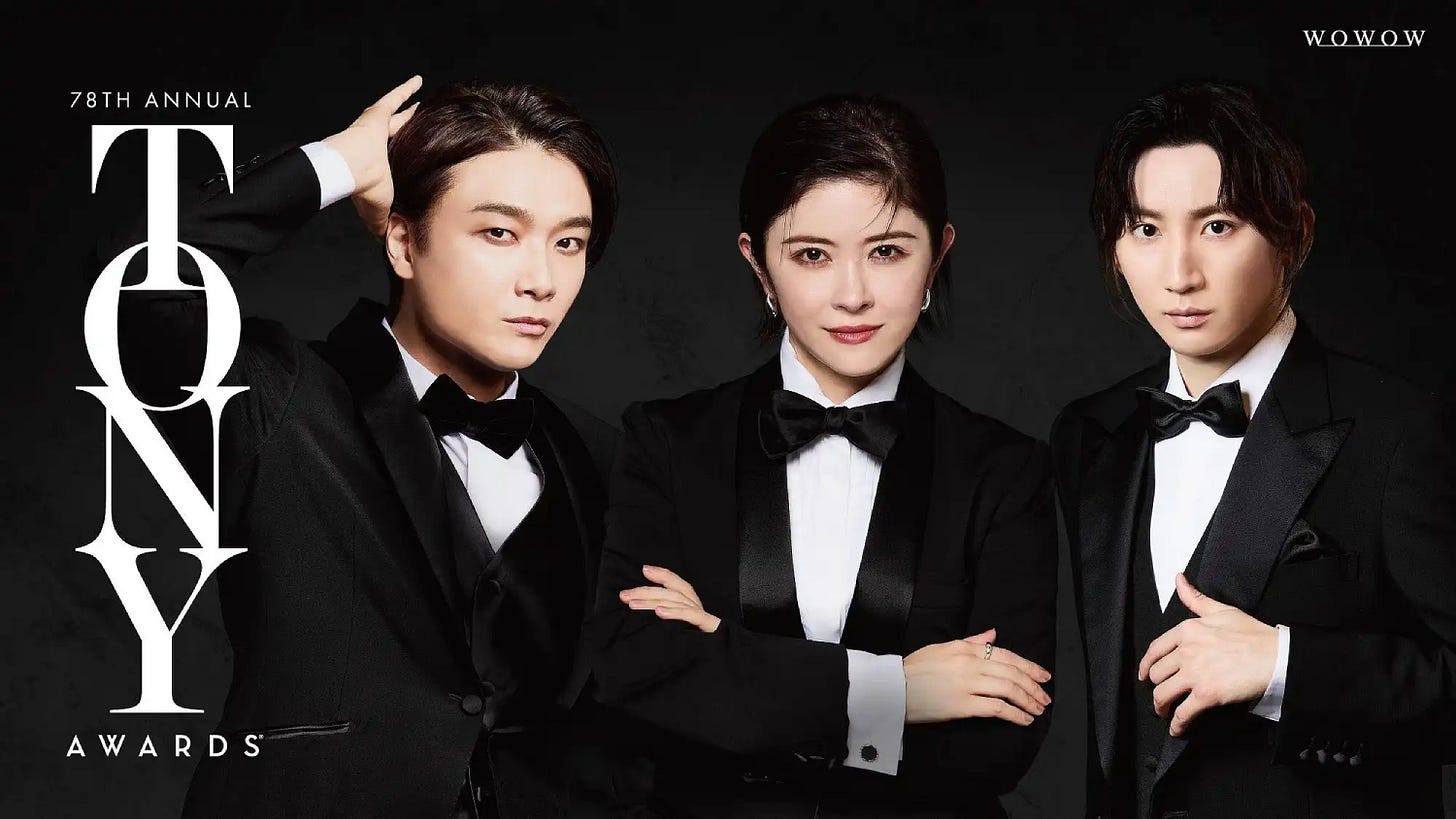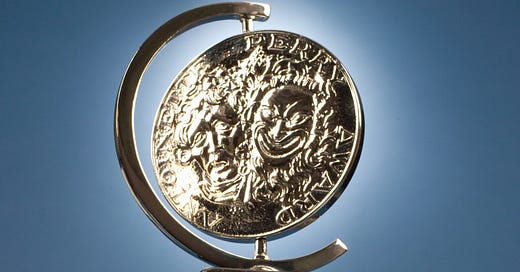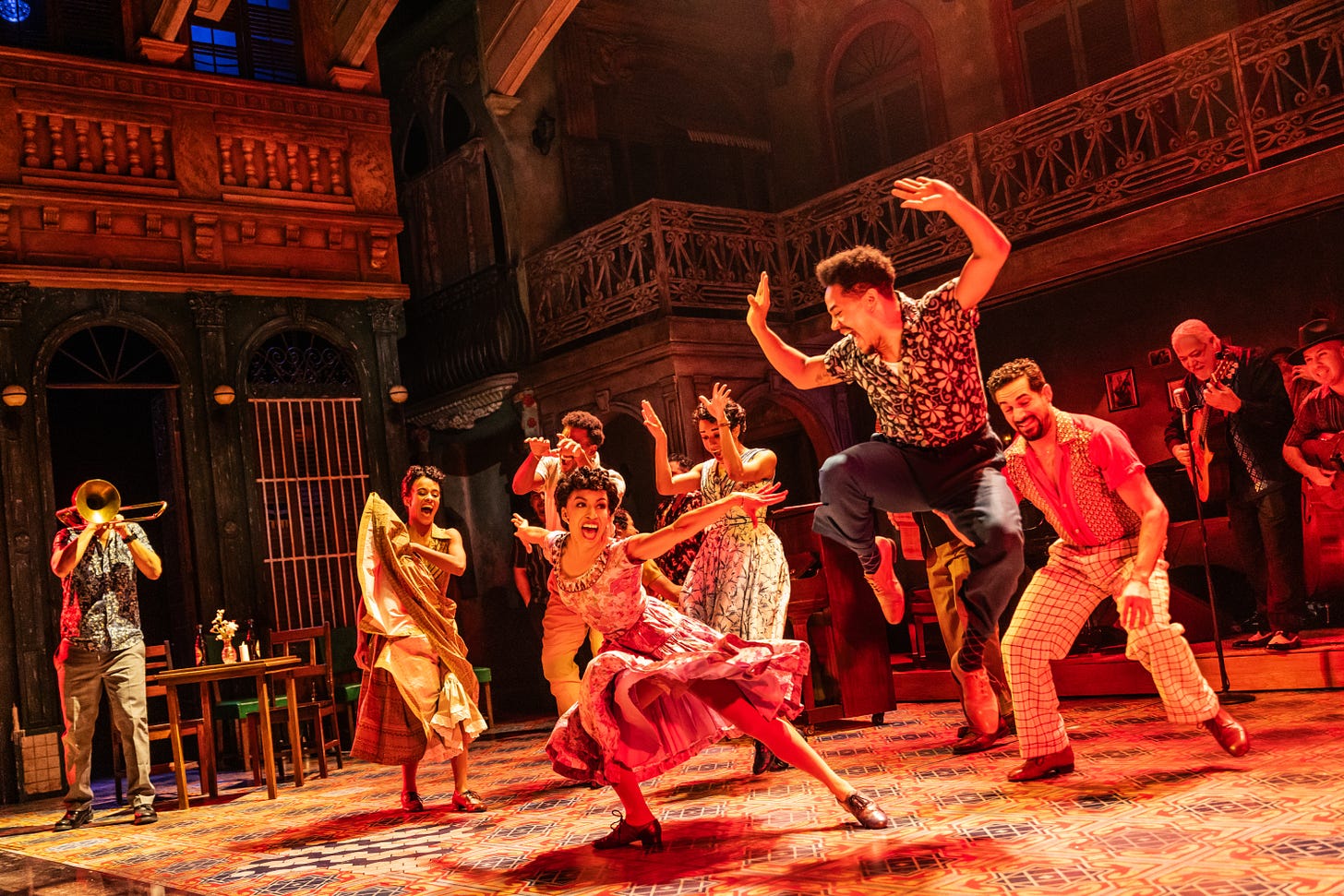THE TONY AWARDS ISSUE (2025 EDITION)
How the Tonys show up around the world, and how the world shows up at the Tonys
Welcome to your weekly guide to the global theater industry. New to Jaques? Check out this handy explainer.
The Tony Awards have always lived at an awkward intersection of global and hyper-local.
They’re one of the four American entertainment awards that make up the world-famous EGOT quartet. But the TV shows honored by the Emmys, the music anointed by the Grammys, and the movies crowned by the Oscars are all nationally distributed and available on screens and devices around the country (and often around the world). The Tonys, on the other hand, focus on shows that are only playing on stages within one 12-block section of midtown Manhattan, and the night’s biggest trophies go to new titles that most people around the country haven’t even heard of yet, much less had a chance to see.
Navigating that tension is a constant challenge for the Tony Awards. But the televised annual ceremony, this year set for June 8 and airing in the U.S. on CBS and its streaming service Paramount+, is Broadway’s biggest promotional opportunity of the year by far. The new musicals that will perform excerpts of their shows throughout the telecast this year—including Maybe Happy Ending, Buena Vista Social Club, and Death Becomes Her—are all hoping to turn the heads of potential ticket buyers as they gear up to launch North American touring productions—and, eventually, productions around the world.
That’s where the Tony Awards’ international partners come in. Theater fans across the globe can tune in to the ceremony live, and some of them might just be inspired to buy a ticket to, say, Buena Vista Social Club on their next visit to New York, or when the show comes to their neck of the woods. But who are these Tony fans abroad? And how globally meaningful is a Tony Award, anyway?
In this SPOTLIGHT STORY, I’ll highlight
the global reach of the Tony telecast,
a case study of how the awards are showcased on Japanese television (with a surprisingly robust slate of programming!),
how South Korea, Cuba, and Mexico show up in this year’s Broadway season, and
exactly how a Tony Award can move the needle for a show around the world—and how it can’t.
WHERE IN THE WORLD YOU CAN WATCH
Reps for the Tony Awards tell me that this year they’ve partnered with the following international outlets to air some or all of the Tony ceremony, either live or recorded:
WOWOW (Japan)
CCTV4 (China)
Sky (New Zealand)
Network Ten (Australia)
AMC (Argentina, Brazil, Mexico)
In Latin American regions—where time zones largely overlap with the U.S.—the ceremony airs on Sunday evening or late afternoon. In Australasian territories (12+ hours ahead of New York), the Tonys can be slotted into Monday morning programming with little disruption to a network’s prime evening schedule.
You’ll notice a distinct lack of the U.K. and Europe in this list. There’s no official way to watch the Tonys in that part of the world (in part because the time difference means that the ceremony starts at the inconvenient hour of 1:00 on Monday morning in the U.K.), but intrepid Tony fans recommend getting a VPN and a Paramount+ subscription to watch the show.
I was curious to know what exactly international coverages of the Tonys looks like, so I reached out to WOWOW in Tokyo and connected with Maiko Kanayama, the producer of the network’s live Tony Awards (トニー賞) broadcasting in Japan. Here’s what she told me, in an interview we conducted over email.

トニー賞 : A CASE STUDY
I first got a sense of how robust your theater coverage is when I was interviewed in April for one of your TV specials about the Tony nominations. What does the network’s overall Tony programming look like?
MAIKO KANAYAMA, PRODUCER: WOWOW has held the exclusive rights to broadcast the Tony Awards in Japan since 2014, making this our 11th year.
Each year, from April to June, we broadcast and stream special programming that features the latest news from Broadway as well as highlights on the year’s nominated productions, performers, and creators. This special programming is made up of our original promotional programs to promote the Tony Awards.
This year, we are also spotlighting Maybe Happy Ending—a musical originally from South Korea that was staged in Japan in 2020 and is now nominated for the Tony Awards in its Broadway version—within our special programming.
Our live broadcast of the Tony Awards includes a studio segment produced especially for Japanese viewers. The program is hosted by Japanese presenters alongside Broadway experts who offer commentary and insight as the ceremony unfolds in real time. (As a premium pay TV network, we don’t have any commercials during the program. We will broadcast our studio segments live during the commercial breaks of CBS.)
ACT 1 of the ceremony [the earliest portion of the awards show, encompassing a lot of the design awards and broadcast in the U.S. on Pluto] is also streamed live exclusively in Japan, just as it is in the U.S. Additionally, we provide a rebroadcast with Japanese subtitles on the weekend following the ceremony.
Among your viewers, is there an interest in what’s happening on Broadway overall or in musical theater in general, in addition to what’s happening specifically with the Tony Awards?
MK: Among those who watch the Tony Awards on WOWOW, some viewers are broadly interested in the entire scope of Broadway—both plays and musicals—but the majority tend to be particularly drawn to musicals. One of the biggest highlights for our audience is the performances from nominated shows, which are a hallmark of the Tony Awards broadcast. This is because it is not easy for Japanese audiences to see Broadway productions, and entire performances are rarely broadcast in Japan.
To serve musical theater fans, WOWOW also produces and regularly airs late-night programs dedicated to musicals, hosted by Japanese musical actors. These programs are designed to promote and enrich musical theater culture in Japan, with the Tony Awards broadcast serving as a central pillar of our yearly programming strategy.
I understand you don’t publicly disclose ratings data, but is there a way you might be able to characterize your viewership for the Tonys and for your musical theater programming?
MK: In Japan, Broadway and the Tony Awards are not mainstream interests for the general population. Since WOWOW began airing the Tony Awards 11 years ago, the year we received the greatest public response was 2015, when Hollywood actor Ken Watanabe was nominated for Best Actor in Leading Role in a Musical for his role in The King and I.
In the Japanese theater world—especially in the musical theater—importing and staging Western productions is a common practice. Recently, however, there's been an increase in original productions created in Japan. Interest in the Tony Awards is often tied to this broader engagement with Western musical theater, though it is largely unrelated to Japan’s popular 2.5D musicals based on anime and video games.
Viewers who are drawn to the Tony Awards tend to be fans of Western musicals—particularly their replica or localized versions—or individuals with a strong interest in international culture. In our experience, the core demographic in Japan is women aged 40 and older.
HOW TONYS MATTER (AND HOW THEY DON’T)
It’s a question I’ve asked producers a lot since I started this newsletter: In terms of moving the needle for a show’s international box office, do the Tony Awards… matter?
In general, the answer is no—spoken quietly and off the record, because many of the producers who feel that way are members of the Broadway League and don’t want to be quoted doubting the power of the American industry’s biggest night. For them, the imprimatur of a Tony Award has proven less vital to marketing shows around the world than trumpeting a title’s passport stamp of coming “direct from Broadway.”
But if a Tony win can’t be credited with directly driving box office interest around the world, it’s certainly true that for most shows, a Tony triumph—especially in the category of Best Musical—gives a title the kind of major profile boost that’s vital to cultivating a national and international brand. And even if a Tony won’t grab the attention of consumers abroad, it’ll certainly pique the interest of an awards-savvy international producer who might want to bring the show to their territory.
In fact, if you look at the musicals that have become international powerhouses over the years, nearly every single one of them—Cats, The Phantom of the Opera, Les Misérables, The Lion King, Hamilton, Moulin Rouge!—took home the award for Best Musical. (In recent memory, one of the only shows to hit the global zeitgeist without a Best Musical Tony was Wicked.)
So any way you look at it, the Tonys telecast is a high-stakes affair for all of Broadway—and for all the shows that use Broadway as a launchpad to expanding around the world.
HOW THE WORLD SHOWS UP ON BROADWAY
Meanwhile, the work on Broadway stages has been notably international this season.
You can see it in many of the shows the Tony ceremony will spotlight. There’s Maybe Happy Ending, the Korean-born musical from a transnational creative team that scored ten nominations and is generally considered the frontrunner for Best Musical. Another show to notch 10 noms, Buena Vista Social Club, is based on a documentary about a band of Cuban musicians and has a score performed entirely in Spanish. And Real Women Have Curves, about a Mexican-American family in Los Angeles in the 1980s, has Tony-nominated songs co-written by Joy Huerta, the first Mexican woman to pen tunes for Broadway. All three titles will perform excerpts during the Tony ceremony—and all of this comes on the heels of last season’s The Great Gatsby, the first-ever Broadway show from a solo, Korean lead producer.
Taken together, it all seems to indicate Broadway’s increasing openness to stories with global roots, as well as a rise in international creators and producers aiming to make their mark in New York.
It’s a trend that we surely haven’t seen the last of, especially as the industry continues to globalize and more and more territories start to develop their own original musicals (see: South Korea, Japan, the Philippines, and Spain, to name a few).
And shows like Maybe Happy Ending and Buena Vista Social Club—both risky propositions back when they opened—have proven that international fare can be more than critically beloved. It can have real staying power at the box office, too.
But blazing that trail wasn’t easy, recalls Orin Wolf, the lead producer of Buena Vista Social Club.
“My impulse was always that we were not going to translate the score, and instead do a Broadway musical with a score entirely in a foreign language,” he says. “The challenge for me was sticking to that decision. There were so many doubters—investors and commercial theater people—who were like: Oh, this will never work. But it is!”
FURTHER READING
Get the full story behind the transpacific journey of Maybe Happy Ending in this newsletter from the fall:
HOW MAYBE HAPPY ENDING ENDED UP ON BROADWAY
How a bilingual creative team and an American producer brought one musical to New York across two continents and two languages.
And there’s plenty more Tony coverage from me over at Variety, where you can read my Tony preview (Broadway’s Back on Top—And Breaking All the Rules), check out my podcast with Joy Huerta, the Mexican composer of Real Women Have Curves…
… and read my hot-off-the-press predictions of the night’s winners.
Happy Tonys. See you on the red carpet.






